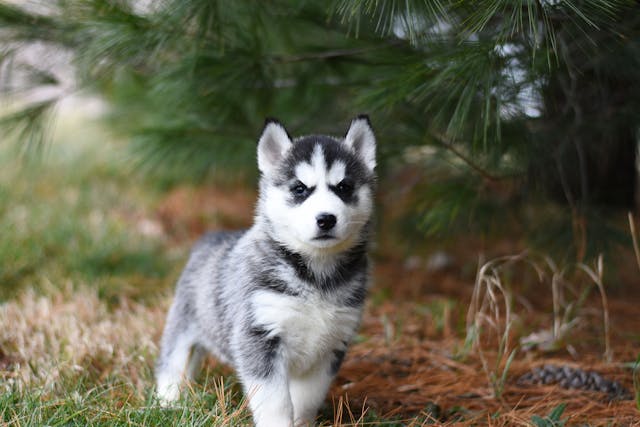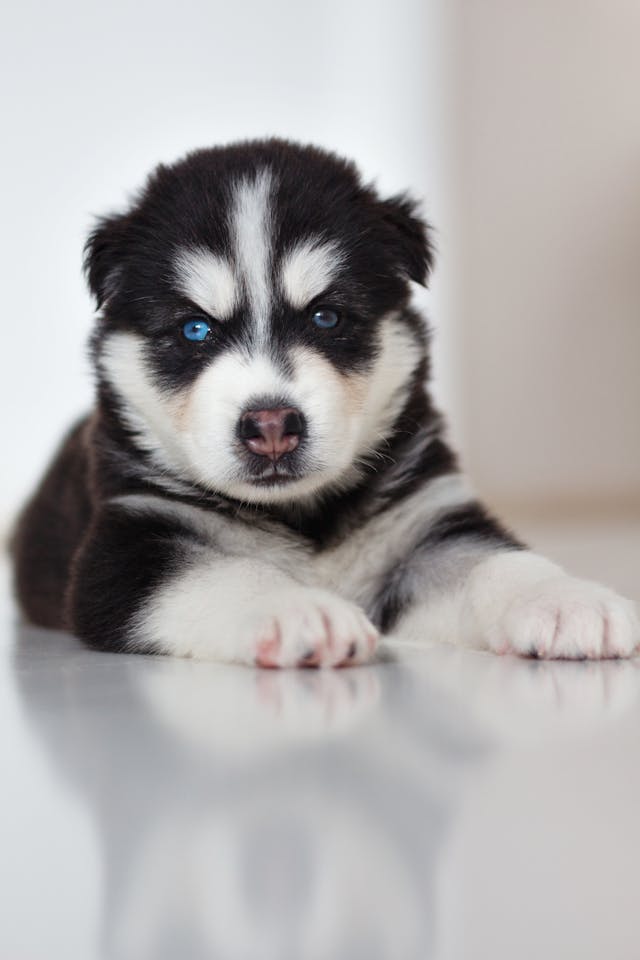If you’ve recently welcomed a 6-week-old Siberian Husky into your life, you’re in for an exciting adventure! Known for their striking blue eyes and playful personalities, Siberian Huskies are a breed that captures hearts instantly. However, caring for such a young puppy requires specialized knowledge and attention to ensure they grow into happy, healthy adult dogs.
Table of Contents
How Big Is a 6-Week-Old Husky?
At six weeks old, Siberian Husky puppies are still small but growing rapidly.
- Weight: Most 6-week-old Huskies weigh between 5 and 8 pounds, depending on their genetics and overall health.
- Height: They are typically around 7–10 inches tall at the shoulder, with lanky legs and a fluffy coat.
This is a crucial growth stage, and proper nutrition and care are essential to support their development.

At What Age Is a Husky Fully Grown?
Siberian Huskies typically reach their full size between 12 and 15 months of age.
- Height: Adult Huskies stand 20–23.5 inches tall at the shoulder.
- Weight: Males weigh 45–60 pounds, while females are slightly smaller at 35–50 pounds.
While their physical growth slows after their first year, Huskies may continue to fill out and develop muscle until they’re around 2 years old.
What to Expect from a 6-Week-Old Siberian Husky
At six weeks, your Husky puppy is transitioning from dependence on their mother to exploring the world independently. They are playful, curious, and beginning to show the traits that make Siberian Huskies such unique companions.
Key Characteristics:
- Energy Level: Playful with short bursts of activity, followed by long naps.
- Teething Stage: Expect chewing on toys and possibly household items.
- Personality: Early signs of independence and intelligence start to shine through.
Feeding Your 6-Week-Old Siberian Husky
Proper nutrition is vital for a growing Husky. At this stage, they are moving from milk to solid food, so gradual transitions are key.
Feeding Tips:
- Meal Frequency: Serve 4 small meals daily to keep their energy consistent.
- Diet Choices: Choose high-quality puppy food tailored for medium-to-large breeds. If necessary, soften kibble with water or puppy formula.
- Avoid Overfeeding: Monitor portion sizes to prevent excessive weight gain, as Huskies are naturally lean and active dogs.

Training and Socialization for a Husky Puppy
Starting training and socialization early is essential to ensure your Husky grows into a well-behaved and confident dog.
Training Basics:
- Simple Commands: Begin with commands like “sit,” “come,” and “stay.” Reward with treats and praise for positive reinforcement.
- Crate Training: Introduce a crate as a safe, cozy space to help with potty training and reduce anxiety.
- Potty Training: Take your puppy outside frequently—especially after meals, naps, and playtime.
Socialization Strategies:
- Gently expose your puppy to different environments, people, and other pets.
- Allow them to explore new sounds and textures to build confidence.
Health Care for a 6-Week-Old Husky
Huskies are generally healthy dogs, but early health care is essential for proper development.
Veterinary Essentials:
- Vaccinations: By six weeks, your pup should begin their vaccination journey to protect against diseases like distemper and parvovirus.
- Deworming: Consult your veterinarian about the deworming schedule to protect against intestinal parasites.
Exercise Needs:
- While Huskies are high-energy dogs, limit activity at this age to short, supervised play sessions. Their developing bones and joints need rest.

What Is the Leading Cause of Death in Huskies?
The leading cause of death in Siberian Huskies, like many other dog breeds, is cancer, particularly in their later years. Other common health concerns include heart disease, hip dysplasia, and specific genetic conditions like progressive retinal atrophy (PRA).
Early health screenings and maintaining a healthy, active lifestyle can help reduce the risk of these issues.

At What Age Is a Husky No Longer a Puppy?
While Huskies reach their full size by around 12–15 months, they are generally considered puppies until they’re about 18 months old.
- Puppy Behavior: They retain their playful, mischievous demeanor well into their second year.
- Adulthood: By 2 years of age, most Huskies settle into their adult personality, balancing energy and calmness.
Building a Bond with Your Husky Puppy
Siberian Huskies are pack animals, and your puppy will see you as their family. Building trust and a strong bond at this age is crucial.
Ways to Bond:
- Spend quality time playing, cuddling, and speaking softly to them.
- Establish a consistent routine for feeding, potty breaks, and bedtime to create a sense of security.
Common Challenges with a 6-Week-Old Husky
Huskies are intelligent and independent, which can make training both rewarding and challenging.
Behavioral Tips:
- Chewing: Provide plenty of chew toys to manage teething and prevent damage to furniture.
- Whining and Howling: Huskies are vocal dogs. While it’s natural for them to communicate, consistent training can help manage excessive whining.
- Separation Anxiety: Keep your puppy’s environment calm and provide comforting toys when they’re alone.
The Joys and Challenges of Owning a 9-Month-Old Siberian Husky
All You Need to Know About Husky-Chi: Husky-Chihuahua Mix
Raising an 8-Month-Old Siberian Husky: What You Need to Know
All About 2-Month-Old Siberian Huskies Can You Handle the Cuteness?

